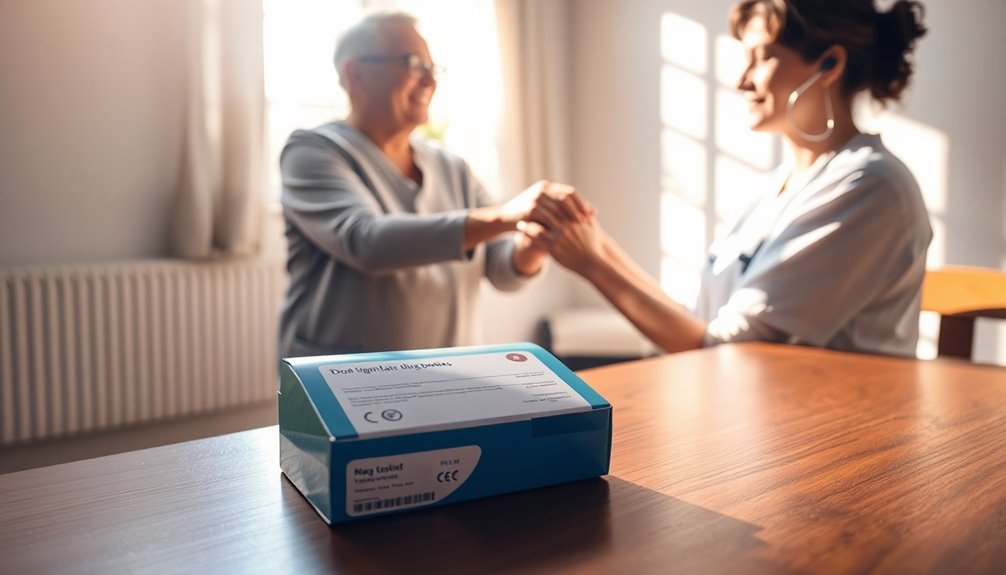Yes, caregivers often get drug tested to guarantee safety and well-being for those they care for. Many organizations, like Home Care Assistance, require thorough screenings before hiring. These tests commonly include urine samples and a 10-panel screening for various substances, including marijuana and opiates. Random drug tests may also happen post-hire to maintain a drug-free environment. If you're curious about the specific types of testing or the process involved, there's more to discover.
Key Takeaways
- Yes, caregivers are typically required to undergo drug testing as part of the hiring process.
- Home Care Assistance mandates pre-employment drug screening to ensure caregiver safety and professionalism.
- Common drug tests include urine samples and 10-panel screenings that detect multiple substances.
- Random drug tests may be conducted post-hire to maintain a drug-free workplace.
- Fair drug testing practices are essential to support caregivers with unique challenges and disabilities.
Importance of Drug Testing in Caregiving

When you're hiring a caregiver for a loved one, knowing they've been drug tested can provide essential peace of mind.
Drug testing is a mandatory part of the hiring process at Home Care Assistance, ensuring caregivers meet high safety and health standards. A thorough pre-employment background check typically includes a 10-panel screening that tests for drugs like amphetamines and cocaine.
This screening helps protect vulnerable populations, such as the elderly, from potential risks associated with drug use. Additionally, employers might conduct random drug tests post-hire to maintain a drug-free workplace.
Types of Drug Tests Used for Caregivers

Knowing the types of drug tests used for caregivers can help you better understand the safety protocols in place.
Caregivers often undergo drug tests, including urine sample tests, which are commonly 10-panel screenings that detect drugs like marijuana, cocaine, and opiates. Many agencies, like Home Care Assistance, require these tests as part of their hiring process to guarantee a safe environment.
Hair sample tests may also be employed, providing a longer detection window of up to 90 days. Additionally, random drug screening can occur post-hire to maintain a drug-free workplace.
Background screening companies utilize these reliable types of tests to assure caregivers meet the necessary standards and can effectively detect drug use.
The Drug Testing Process Explained

The drug testing process for caregivers is a crucial step in ensuring the safety of both clients and staff. Typically, you'll undergo pre-employment testing, which is mandatory at organizations like Home Care Assistance. This process often includes a 10-panel test that screens for various substances, such as marijuana, cocaine, opiates, and amphetamines.
Urine tests are commonly used, allowing for results in as little as 30 minutes when done on-site. Additionally, your employer may implement random drug tests post-hire to maintain a drug-free workplace.
This thorough drug testing process is designed to protect vulnerable populations, ensuring that caregivers meet the highest standards of safety and professionalism in their roles.
Addressing Accessibility for Caregiver Dependent Individuals

While drug testing is essential for ensuring the safety of clients, it can pose significant challenges for caregiver-dependent individuals. Drug tests often lack necessary accommodations, creating barriers that can lead to discrimination.
To enhance accessibility, employers should consider using medical labs like LabCorp, which are more likely to provide reasonable accommodations for caregivers. Clear communication with these facilities about your need for assistance can make a difference in your testing experience. Additionally, advocating for equitable treatment in drug testing policies is vital, as it helps alleviate stress for those who rely on caregivers and can prevent prolonged financial disputes related to caregiving responsibilities. By addressing these issues, we can promote inclusive practices that recognize the unique needs of caregiver-dependent individuals, ensuring they receive fair treatment in the testing process.
Advocacy for Fair Drug Testing Practices

Advocating for fair drug testing practices is vital, especially as caregivers face unique challenges during the screening process. Many caregivers undergo drug tests as part of the hiring process, but it's imperative to guarantee that practices are equitable and just.
Consider these points:
- Reasonable accommodations should be provided for individuals with disabilities, including caregiver assistance.
- Legislative changes around marijuana legalization need to be reflected in updated drug testing policies.
- Clear communication and training can help prevent discriminatory treatment during testing.
Frequently Asked Questions
Do You Need to Pass a Drug Test to Be a Caregiver?
To become a caregiver, you'll typically need to pass a drug test. This step helps guarantee the safety of those you'll be caring for.
Employers often require a standard drug screening, which checks for various substances. If you're hired, you might also face random drug tests to maintain a drug-free workplace.
If you have any challenges with the testing process, don't hesitate to request accommodations to guarantee everything goes smoothly.
Do Health Care Workers Get Drug Tested?
Yes, health care workers often get drug tested as part of their employment process.
You'll likely face a pre-employment screening, which typically includes a 10-panel drug test. This checks for various substances to guarantee a safe environment for patients.
Some employers may also conduct random tests after hiring to maintain a drug-free workplace.
The testing is usually urine-based and provides quick results, often the same day for non-positive outcomes.
What Jobs Are Least Likely to Drug Test?
In a world where creativity flows like a river, jobs in the creative arts—like graphic designers and writers—rarely require drug testing.
Similarly, tech positions, especially remote ones, prioritize skills over scrutiny.
Retail and hospitality roles often focus on filling positions quickly, so testing isn't common.
Even some nonprofits value mission over monitoring, allowing for a more open approach.
Does Home Health Aide Drug Test?
Yes, home health aides often undergo drug testing, depending on the agency or employer's policies.
Typically, pre-employment drug tests are required to guarantee a safe environment for clients. You might encounter a 10-panel test evaluating various substances, including amphetamines and opiates.
Additionally, some employers may conduct random drug tests after hiring to maintain a drug-free workplace.
It's crucial to check specific agency requirements before applying for a position.
Conclusion
In summary, drug testing is essential in caregiving to guarantee safety and trust. Did you know that nearly 10% of healthcare workers have reported substance abuse issues? This statistic highlights the need for effective testing practices. By understanding the types of drug tests and the process involved, you can advocate for a fair and accessible approach that protects both caregivers and those they serve. Together, we can foster a safer environment for everyone involved in caregiving.









